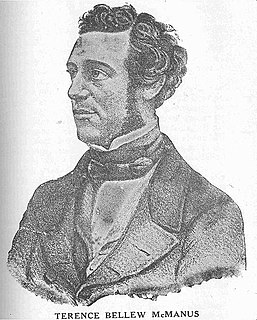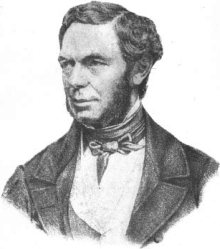Related Research Articles

The Nation was an Irish nationalist weekly newspaper, published in the 19th century. The Nation was printed first at 12 Trinity Street, Dublin from 15 October 1842 until 6 January 1844. The paper was afterwards published at 4 D'Olier Street from 13 July 1844, to 28 July 1848, when the issue for the following day was seized and the paper suppressed. It was published again in Middle Abbey Street on its revival in September 1849.

Daniel O'Connell, hailed in his time as The Liberator, was the acknowledged political leader of Ireland's Roman Catholic majority in the first half of the 19th century. His mobilisation of Catholic Ireland through to the poorest class of tenant farmer helped secure Catholic emancipation in 1829 and allowed him to take a seat in the United Kingdom Parliament to which he had twice been elected. At Westminster O'Connell championed liberal and reform causes but failed in his declared objective for Ireland: the restoration of a separate Irish Parliament through repeal of the 1800 Act of Union. Against the background of a growing agrarian crisis and, in his final years, of the Great Irish Famine, O'Connell contended with dissension at home. Criticism of his political compromises and system of patronage led to a split in the national movement he had singularly led.

Sir Charles Gavan Duffy, KCMG, PC, was an Irish poet and journalist, Young Irelander and tenant-rights activist. After emigrating to Australia in 1856 he entered the politics of Victoria on a platform of land reform, and in 1871-72 served as the colony's 8th Premier.

William Smith O'Brien was an Irish nationalist Member of Parliament (MP) and a leader of the Young Ireland movement. He also encouraged the use of the Irish language. He was convicted of sedition for his part in the Young Irelander "Famine Rebellion" of 1848 but his sentence of death was commuted to deportation to Van Diemen's Land. In 1854, he was released on the condition of exile from Ireland, and he lived in Brussels for two years. In 1856 Smith O'Brien was pardoned and returned to Ireland, but he was never active again in politics.

Ballingarry is a village and civil parish in County Tipperary, Ireland. Ballingarry is one of 19 civil parishes in the barony of Slievardagh, and also an ecclesiastical parish in the Roman Catholic Archdiocese of Cashel and Emly. Ballingarry village is situated near the Kilkenny border on route R691 in the Slieveardagh range. Historically, the area was associated with the coal mining industry.

St Patrick's, Carlow College, is a liberal arts college located in Carlow, Ireland. The college is the second oldest third level institution in Ireland have been founded in 1782 by James Keefe, then Roman Catholic Bishop of Kildare and Leighlin, and his co-adjutor bishop Daniel Delany.

John Blake Dillon was an Irish writer and politician who was one of the founding members of the Young Ireland movement.

Terence Bellew MacManus was an Irish rebel who participated in the Young Irelander Rebellion of 1848. Sentenced to death for treason, he and several other participants were given commuted sentences in 1849 and transported for life to Van Diemen's Land in Australia. Three years later in 1852, MacManus escaped and emigrated to the United States.

Young Ireland was a political and cultural movement in the 1840s committed to an all-Ireland struggle for independence and democratic reform. Grouped around the Dublin weekly The Nation, it took issue with the compromises and clericalism of the larger national movement, Daniel O'Connell's Repeal Association, from which it seceded in 1847. Despairing, in the face of the Great Famine, of any other course, in 1848 Young Irelanders attempted an insurrection. Following the arrest and the exile of most of their leading figures, the movement split between those who carried the commitment to "physical force" forward into the Irish Republican Brotherhood, and those who sought to build a "League of North and South" linking an independent Irish parliamentary party to tenant agitation for land reform.
The Young Irelander Rebellion was a failed Irish nationalist uprising led by the Young Ireland movement, part of the wider Revolutions of 1848 that affected most of Europe. It took place on 29 July 1848 at Farranrory, a small settlement about 4.3 km north-northeast of the village of Ballingarry, South Tipperary. After being chased by a force of Young Irelanders and their supporters, an Irish Constabulary unit took refuge in a house and held those inside as hostages. A several-hour gunfight followed, but the rebels fled after a large group of police reinforcements arrived.

Michael Doheny was an Irish writer, lawyer, member of the Young Ireland movement, and co-founder of the Irish Republican Brotherhood, an Irish secret society which would go on to launch the Fenian Raids on Canada, Fenian Rising of 1867 and the Easter Rising of 1916, each of which was an attempt to bring about Irish Independence from Britain.

James Fintan Lalor was an Irish revolutionary, journalist, and “one of the most powerful writers of his day.” A leading member of the Irish Confederation, he was to play an active part in both the Rebellion in July 1848 and the attempted Rising in September of that same year. Lalor's writings were to exert a seminal influence on later Irish leaders such as Michael Davitt, James Connolly, Pádraig Pearse, and Arthur Griffith.

Patrick O'Donoghue (1810–1854), also known as Patrick O'Donohoe or O'Donoghoe, from Clonegal, County Carlow, was an Irish Nationalist revolutionary and journalist, a member of the Young Ireland movement.

Thomas Devin Reilly(Tomás Damhán Ó Raghailligh) was an Irish revolutionary, Young Irelander and journalist.
Michael Slattery (1783–1857) was a Roman Catholic clergyman who served as the Archbishop of Cashel & Emly from 1833 to 1857.

Patrick James Smyth, also known as Nicaragua Smyth, was an Irish politician and journalist. A Young Irelander in 1848, and subsequently a journalist in American exile, from 1871 he was an Irish Home Rule Member of the United Kingdom Parliament for Westmeath and from 1880 for Tipperary.

Mary Immaculate College, (MIC) Thurles is a third level college of education in Thurles, County Tipperary. Formerly a seminary, the college specialises in humanities courses in accounting, business studies, Irish and religious studies.
Richard D'Alton Williams was an Irish physician and poet, "Shamrock" of the Nation.
John Kenyon (1812–1869) was an Irish Catholic priest and nationalist, who was involved in the Young Ireland movement and the Irish Confederation. He was renowned for his strong political and religious views which alienated him from many of his colleagues, and resulted in his being twice suspended from clerical duties. In particular, Kenyon was known for his opposition to the Irish political leader, Daniel O'Connell. Kenyon advocated the use of force to achieve political goals and refused to condemn slavery.
The Tipperary Leader was a title used by a number of publications in Co. Tipperary, Ireland.
References
- ↑ The Felons Track by Michael Doheny.
- ↑ FROM THE NOTEBOOKS OF THE LATE CANON FOGARTY(no. 31) by Canon JJ Condon.
- ↑ William Smith O'Brien Trial Origins.Net.
- ↑ 1848 Rebels on the Run www.killenaule.net
- ↑ Maurice Leyne - Thurles Famine Museum in Tipperary Reopens.